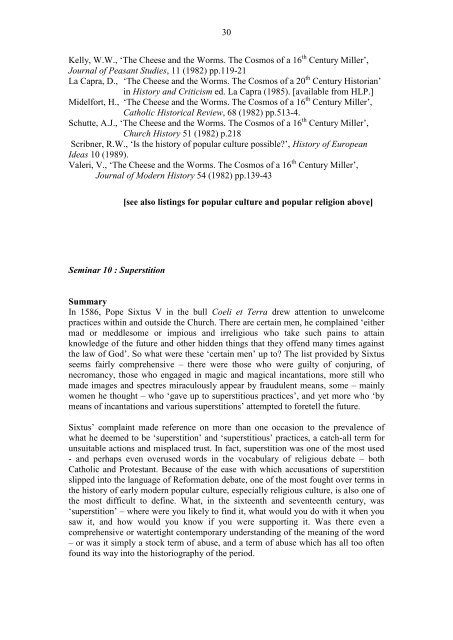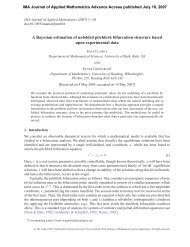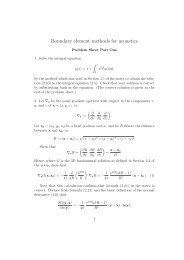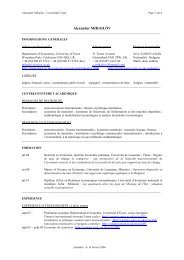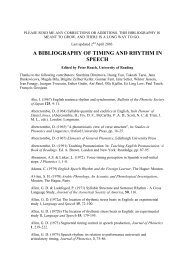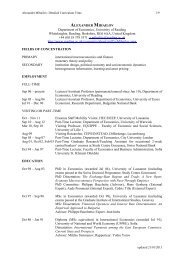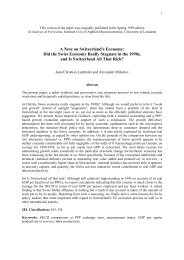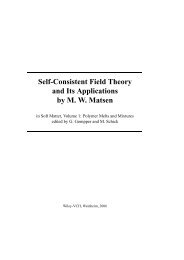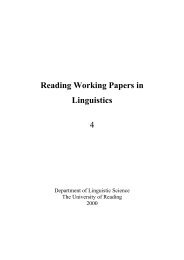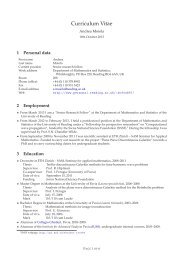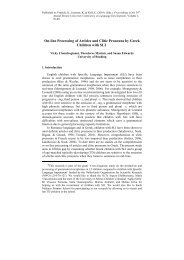Ritual, Myth and Magic in Early Modern Europe - University of Reading
Ritual, Myth and Magic in Early Modern Europe - University of Reading
Ritual, Myth and Magic in Early Modern Europe - University of Reading
Create successful ePaper yourself
Turn your PDF publications into a flip-book with our unique Google optimized e-Paper software.
30<br />
Kelly, W.W., ‗The Cheese <strong>and</strong> the Worms. The Cosmos <strong>of</strong> a 16 th Century Miller‘,<br />
Journal <strong>of</strong> Peasant Studies, 11 (1982) pp.119-21<br />
La Capra, D., ‗The Cheese <strong>and</strong> the Worms. The Cosmos <strong>of</strong> a 20 th Century Historian‘<br />
<strong>in</strong> History <strong>and</strong> Criticism ed. La Capra (1985). [available from HLP.]<br />
Midelfort, H., ‗The Cheese <strong>and</strong> the Worms. The Cosmos <strong>of</strong> a 16 th Century Miller‘,<br />
Catholic Historical Review, 68 (1982) pp.513-4.<br />
Schutte, A.J., ‗The Cheese <strong>and</strong> the Worms. The Cosmos <strong>of</strong> a 16 th Century Miller‘,<br />
Church History 51 (1982) p.218<br />
Scribner, R.W., ‗Is the history <strong>of</strong> popular culture possible?‘, History <strong>of</strong> <strong>Europe</strong>an<br />
Ideas 10 (1989).<br />
Valeri, V., ‗The Cheese <strong>and</strong> the Worms. The Cosmos <strong>of</strong> a 16 th Century Miller‘,<br />
Journal <strong>of</strong> <strong>Modern</strong> History 54 (1982) pp.139-43<br />
[see also list<strong>in</strong>gs for popular culture <strong>and</strong> popular religion above]<br />
Sem<strong>in</strong>ar 10 : Superstition<br />
Summary<br />
In 1586, Pope Sixtus V <strong>in</strong> the bull Coeli et Terra drew attention to unwelcome<br />
practices with<strong>in</strong> <strong>and</strong> outside the Church. There are certa<strong>in</strong> men, he compla<strong>in</strong>ed ‗either<br />
mad or meddlesome or impious <strong>and</strong> irreligious who take such pa<strong>in</strong>s to atta<strong>in</strong><br />
knowledge <strong>of</strong> the future <strong>and</strong> other hidden th<strong>in</strong>gs that they <strong>of</strong>fend many times aga<strong>in</strong>st<br />
the law <strong>of</strong> God‘. So what were these ‗certa<strong>in</strong> men‘ up to? The list provided by Sixtus<br />
seems fairly comprehensive – there were those who were guilty <strong>of</strong> conjur<strong>in</strong>g, <strong>of</strong><br />
necromancy, those who engaged <strong>in</strong> magic <strong>and</strong> magical <strong>in</strong>cantations, more still who<br />
made images <strong>and</strong> spectres miraculously appear by fraudulent means, some – ma<strong>in</strong>ly<br />
women he thought – who ‗gave up to superstitious practices‘, <strong>and</strong> yet more who ‗by<br />
means <strong>of</strong> <strong>in</strong>cantations <strong>and</strong> various superstitions‘ attempted to foretell the future.<br />
Sixtus‘ compla<strong>in</strong>t made reference on more than one occasion to the prevalence <strong>of</strong><br />
what he deemed to be ‗superstition‘ <strong>and</strong> ‗superstitious‘ practices, a catch-all term for<br />
unsuitable actions <strong>and</strong> misplaced trust. In fact, superstition was one <strong>of</strong> the most used<br />
- <strong>and</strong> perhaps even overused words <strong>in</strong> the vocabulary <strong>of</strong> religious debate – both<br />
Catholic <strong>and</strong> Protestant. Because <strong>of</strong> the ease with which accusations <strong>of</strong> superstition<br />
slipped <strong>in</strong>to the language <strong>of</strong> Reformation debate, one <strong>of</strong> the most fought over terms <strong>in</strong><br />
the history <strong>of</strong> early modern popular culture, especially religious culture, is also one <strong>of</strong><br />
the most difficult to def<strong>in</strong>e. What, <strong>in</strong> the sixteenth <strong>and</strong> seventeenth century, was<br />
‗superstition‘ – where were you likely to f<strong>in</strong>d it, what would you do with it when you<br />
saw it, <strong>and</strong> how would you know if you were support<strong>in</strong>g it. Was there even a<br />
comprehensive or watertight contemporary underst<strong>and</strong><strong>in</strong>g <strong>of</strong> the mean<strong>in</strong>g <strong>of</strong> the word<br />
– or was it simply a stock term <strong>of</strong> abuse, <strong>and</strong> a term <strong>of</strong> abuse which has all too <strong>of</strong>ten<br />
found its way <strong>in</strong>to the historiography <strong>of</strong> the period.


